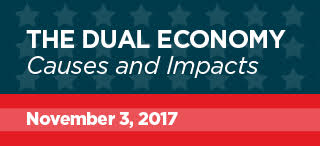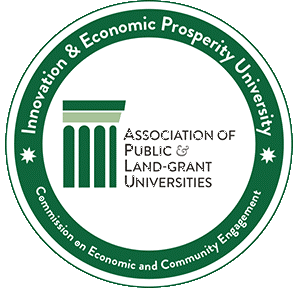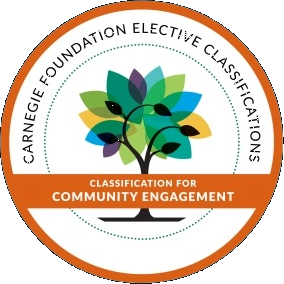Friday, November 3, 2017 | 9:00 a.m. - 4:45 p.m.
The James B. Henry Center for Executive Development
3535 Forest Rd
Lansing, MI 48910
Learn about and discuss America’s increasingly dual economy—the widening income gap between rich and poor. We are bringing together a multidisciplinary assemblage of state, regional, and local practitioners and policy makers from both the public and the private sectors to discuss our changing economy and its impact on the workforce.
For more information on the event, please contact Arnold Weinfeld, Director, Urban Policy Initiative, University Outreach and Engagement, weinfel8@msu.edu.
The Program
High level presentations from national and state leaders will focus on the economic and social benefits of a new direction in public policy, one that embraces principles of equity, fairness, and inclusion, to bring about economic and social benefits locally and regionally.
From municipal and business leaders to regional and state agency organizations, nonprofit associations and philanthropic and social service organizations, it is time to deepen our own knowledge and understanding of these issues so that we may begin to address them. Equity and inclusion are no longer just social causes, but economic imperatives.
The Issues
In the past decade or more, Michigan has been at the forefront of changes to America’s economy. The loss of manufacturing jobs during this time has meant a dramatic shift in work available and led to a loss of income for many, not just here but across the country. While Michigan unemployment is now below the national average and the auto industry is strong, our per capita income has fallen from a top-ten state to the bottom half. And, according to the Michigan Association of United Ways ALICE report,1 40% of Michigan households cannot afford basic necessities.
At the same time our demographics are changing. By the end of this decade, the majority of those under 18 in the United States will be non-White. By 2032, the majority of the workforce will be non-White; and in the early 2040s, the United States majority will be people of color, and only 47% White by 2050. In Michigan, our population is being kept level not by native births, but by immigrants and refugees seeking a better life.
Changing demographics. Low unemployment. Strong auto industry. Drop in per capita income. Taken together it is becoming clear that a dual economy has been created, one where the gap between those who have and those who struggle has continued to widen. Unless we put in place strategies and tools to create better equity and inclusion in the prosperous economy, this gap will continue to accelerate and we will continue to become a poorer state and poorer country.
Agenda
| Time | Program |
|---|---|
| 8:15 – 9:00 a.m. | Registration and refreshments |
| 9:00 – 9:15 a.m. |
Opening remarks |
| 9:15 - 10:00 a.m. | The Fall and Rise of Income Inequality Charles Ballard, Professor, Department of Economics, Michigan State University |
| 10:00 – 10:45 a.m. | The ALICE Project Nancy Lindman, Director, Public Policy and Partnerships, Michigan Association of United Ways |
| 10:45 – 11:00 a.m. | Break |
| 11:00 – 11:45a.m. | Building Inclusive Economies in a Disruptive Era Alan Berube, Senior Fellow and Deputy Director, Metropolitan Policy Program, Brookings Institution |
| 11:45 a.m. – 12:30 p.m. |
Lunch |
| 12:30 p.m. – 1:15 p.m. |
A New Covenant for Balance and Inclusion |
| 1:15 – 2:00 p.m. | Can America Win the Economic Future? Mike Green, Co-Founder, ScaleUp Partners |
| 2:00 – 2:15 p.m. | Break |
| 2:15 – 3:30 p.m. | Roundtable discussions |
| 3:30 – 4:15 p.m. | Equity and Innovation in Economic Development Jess Zimbabwe, Director, Urban Development, National League of Cities, Executive Director, Daniel Rose Center for Public Leadership |
| 4:15 – 4:45 p.m. | Close with discussion of next steps |
Please join us on November 3 to discuss these very important issues affecting our state and nation.
This event is by invitation only, but if you are interested in attending and believe you can contribute to the conversation, then please contact Arnold Weinfeld.
Keep visiting our website for program updates
Sources
- “Asset Limited, Income Constrained, Employed”; see http://www.unitedwayalice.org/Michigan/Back to Event Information
- Johnson, R. A. (2017, Summer). Rethinking the wealth of nations: A vision for a new America. [Review of the book The future economy and inclusive competitiveness: How demographic trends and innovation can create economic prosperity for all Americans, by J. M. Holifield]. Boulé Journal, 81(2), 101-103.
- Blackwell, A. G. (2017, Winter). The curb-cut effect. Stanford Social Innovation Review, 15(1), 28-33.













